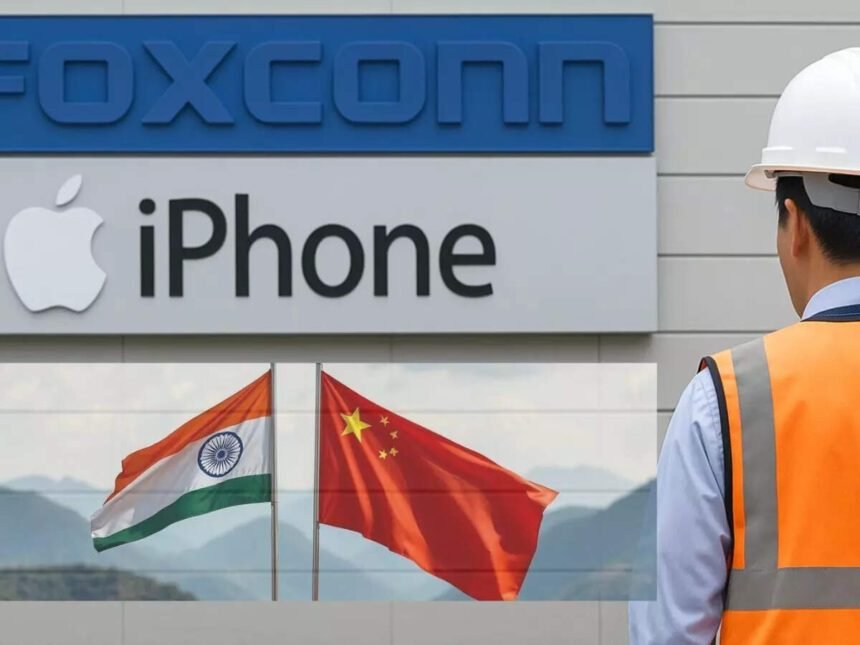Chennai, July 3, 2025 — Just a day after reports emerged that Foxconn Technology Group was allegedly forced by Beijing to recall its Chinese engineers and technicians from its Tamil Nadu manufacturing plant, new developments suggest that the global electronics giant has already activated a strategic “Plan B” to safeguard its India operations—especially the critical production line for Apple’s upcoming iPhone 17.
According to highly placed sources, Foxconn is now mobilizing a new team of senior technicians and engineers from Taiwan and Vietnam to fill the sudden gap left by the exit of Chinese personnel. The decision, insiders say, was taken within hours of Beijing’s directive, in an effort to minimize disruption to Apple’s supply chain and avoid delays in the iPhone 17 rollout, which is expected to begin trial production in India by August 2025.
Background: China’s Political Pressure on Global Tech
Tensions between China and Taiwan, as well as China’s increasing scrutiny of companies seen as shifting operations abroad, have reportedly impacted Foxconn’s internal resource allocation. The company—headquartered in Taiwan—has historically relied on a blend of Chinese and Taiwanese expertise at its global plants. However, this delicate balance seems to have tipped after Chinese authorities allegedly intervened in Foxconn’s India workforce strategy.
Reports claim that over 100 Chinese engineers and technicians who were stationed at the Tamil Nadu facility to oversee equipment installation and process setup were asked to return to China last week. This move has raised alarms within India’s electronics manufacturing sector, which is seeing massive investment inflows under the Production Linked Incentive (PLI) scheme.
Foxconn’s Swift Pivot: Tapping Non-Chinese Talent
Foxconn’s immediate response to this geopolitical roadblock has been decisive and proactive. The company is said to be expediting the transfer of specialized teams from its Taiwanese and Vietnamese plants—both of which have robust experience in iPhone production and assembly.
“Foxconn is not new to global crisis management. The India plant is a top priority in Apple’s diversification strategy. The shift from Chinese to Taiwanese/Vietnamese personnel is already underway, with chartered flights and fast-track immigration support being arranged,” said a senior industry official familiar with the matter.
Apple’s ‘China+1’ Strategy Faces First Major Test
Apple’s push to reduce dependency on China—known in the industry as the “China+1” strategy—has gained momentum over the past two years. With Foxconn, Pegatron, and Wistron ramping up iPhone manufacturing capabilities in India, the country has emerged as a vital player in Apple’s global ambitions.
However, the recent friction with Chinese manpower at Indian plants underscores the geopolitical vulnerabilities facing global electronics manufacturing. This episode could accelerate efforts by Apple and its partners to invest more in localized talent development and engineering capacity in India.
What It Means for India and iPhone 17 Production
Despite the disruption, industry experts remain confident that iPhone 17 production in India will stay on track. Sources suggest that most of the groundwork—such as cleanroom setup, component integration, and process design—had already been completed before the Chinese teams were recalled.
“Foxconn’s Plan B is more than just a temporary patch; it’s a long-term pivot toward self-reliance in India,” said an analyst from a global tech consultancy firm. “This could mark a turning point where Indian electronics manufacturing becomes more independent of China-linked expertise.”
As Foxconn’s replacement engineers begin arriving in Tamil Nadu, the company’s ability to navigate geopolitical headwinds while keeping production timelines intact will be closely watched. For India, this is both a challenge and an opportunity—to showcase its readiness to support high-end electronics manufacturing and reduce global dependence on a single nation.
Whether this episode proves to be a speed bump or a seismic shift will depend on how quickly Foxconn’s “Plan B” team gets operations back to full strength—and how Apple recalibrates its India strategy in response.






